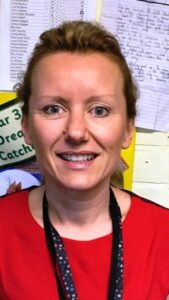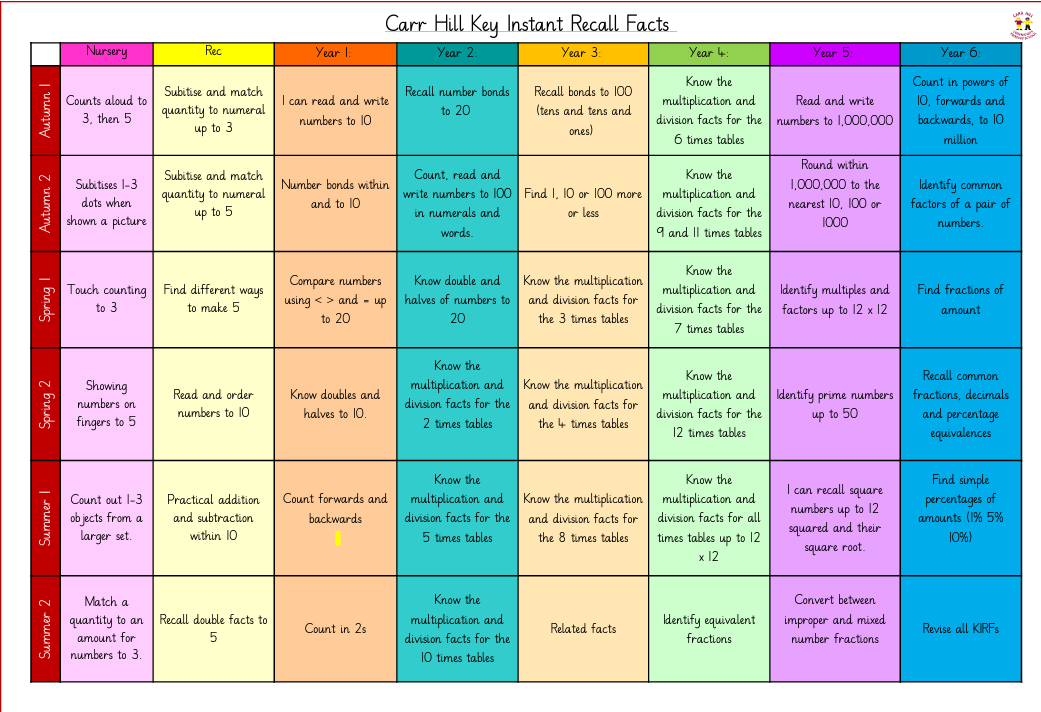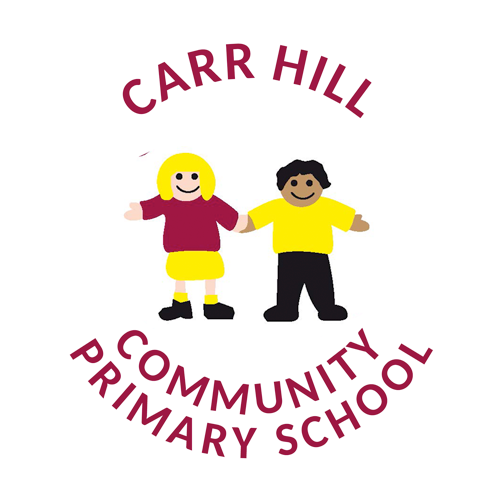

Mrs Mills and Mr McGill lead the teaching of Mathematics in School.
Our Intent for Mathematics
At Carr Hill Community Primary School, we are on our ‘Mastery Journey’ to support a long-term, secure and adaptable approach to mathematics teaching, supporting learners to become motivated, curious, resilient learners, working efficiently by making effective links between concepts and relationships. Our aim is for children to be able to attempt routine tasks and problem solving that will become an integral part of their future. Teaching is supported by “The Big 5 Ideas” where teachers use coherence, representation and structure, mathematical thinking, fluency and both conceptual and procedural variation.
Our approach is based on high expectations and the belief that all children can succeed in their mathematical learning journey. We promote a ‘can do’ attitude to maths without a fear of making mistakes, and ‘if you can’t do it, you can’t do it yet.’ We believe that making mistakes and asking questions are important. We want mathematics lessons to be about learning and feel that depth of knowledge is much more important than speed. Children will therefore be given time, support and resources to develop a depth of understanding in maths.
This approach is in accordance with the aims of the National Curriculum for mathematics to ensure that all pupils:
become fluent in the fundamentals of mathematics, including through varied and frequent practice with increasingly complex problems over time, so that pupils develop conceptual understanding and the ability to recall and apply knowledge rapidly and accurately
reason mathematically by following a line of enquiry, conjecturing relationships and generalisations, and developing an argument, justification or proof using mathematical language
can solve problems by applying their mathematics to a variety of routine and non-routine problems with increasing sophistication, including breaking down problems into a series of simpler steps and persevering in seeking solutions.
Our Implementation for Mathematics
From Reception to Year 6, maths is taught daily and explores the three broad aims of the National Curriculum (2014): Fluency, Reasoning and Problem Solving. Our maths curriculum design is based on principles of a cyclical approach to allow children to revisit and consolidate previously taught content, as well as acquire new learning and understanding of mathematical concepts and procedures. We have created a curriculum using National Curriculum objectives aligned with small, coherent steps of manageable learning.
Mathematics is a core subject in the National Curriculum, and we use the Primary Framework as the basis for implementing the statutory requirements of the programme of study for mathematics. Teachers will also refer to the materials produced by the White Rose Maths Hub Team, the Mastery Materials produced by NCETM and NRICH materials, as well as other resources which offer rich and varied activities involving fluency, reasoning and problem solving, to ensure the aims of the National Curriculum are covered by all children at an appropriate level.
- Lessons are taught daily across the school (weekly in Nursery)
- Teachers provide opportunities for children to discuss maths.
- Teaching is underpinned by methodical curriculum design and supported by carefully crafted lessons and resources to foster deep conceptual and procedural knowledge.
- Practice and consolidation play a central role. Carefully designed variation within this builds fluency and understanding of underlying mathematical concepts.
- Teachers use precise questioning in class to test conceptual and procedural knowledge and assess children regularly to identify those requiring intervention, so that all children keep up.
- Resources are offered to aid understanding may include concrete, pictorial or abstract representations.
- Teachers use questions to promote reasoning: “How do you know? Can you prove it? True or false? Can you explain…?”
- Teachers allow children opportunities to demonstrate mathematical understanding.
- Adapted from Jerome Bruner’s Concrete, Pictorial and Abstract Approach to maths, our school also includes the addition of ‘Language’ as an additional element of a maths lesson to promote deep and sustainable understanding.
- Our Calculation Policy covers the four operations to provide teachers with suggestions of how to implement each element of the CPA approach. Progressive from Y1-Y6
- Regular and ongoing assessment informs teaching, as well as intervention, to support and enable the success of each child.
The Impact of Mathematics
The impact of our mathematics curriculum on our children is evidenced by their progress, sustained learning and transferrable skills acquired. The intended impact of our curriculum is that children build a conceptual and procedural understanding across all areas of mathematics. We aim to provide relevant links so children will have a sound understanding of how maths works in the world around them. At Carr Hill, our children are enthusiastic, enjoy mathematics and are develop their resilience and confidence with fluency, reasoning and problem solving within mathematics.
Purpose of study
Mathematics is a creative and highly interconnected discipline that has been developed over centuries, providing the solution to some of history’s most intriguing problems. It is essential to everyday life, critical to science, technology and engineering, and necessary for financial literacy and most forms of employment. A high-quality mathematics education therefore provides a foundation for understanding the world, the ability to reason mathematically, an appreciation of the beauty and power of mathematics, and a sense of enjoyment and curiosity about the subject.
Aims
The national curriculum for mathematics aims to ensure that all pupils:
- become fluent in the fundamentals of mathematics, including through varied and frequent practice with increasingly complex problems over time, so that pupils develop conceptual understanding and the ability to recall and apply knowledge rapidly and accurately
- reason mathematically by following a line of enquiry, conjecturing relationships and generalisations, and developing an argument, justification or proof using mathematical language
- can solve problems by applying their mathematics to a variety of routine and non-routine problems with increasing sophistication, including breaking down problems into a series of simpler steps and persevering in seeking solutions
Mathematics is an interconnected subject in which pupils need to be able to move fluently between representations of mathematical ideas. The programmes of study are, by necessity, organised into apparently distinct domains, but pupils should make rich connections across mathematical ideas to develop fluency, mathematical reasoning and competence in solving increasingly sophisticated problems. They should also apply their mathematical knowledge to science and other subjects.
The expectation is that the majority of pupils will move through the programmes of study at broadly the same pace. However, decisions about when to progress should always be based on the security of pupils’ understanding and their readiness to progress to the next stage. Pupils who grasp concepts rapidly should be challenged through being offered rich and sophisticated problems before any acceleration through new content. Those who are not sufficiently fluent with earlier material should consolidate their understanding, including through additional practice, before moving on.
Information and communication technology (ICT)
Calculators should not be used as a substitute for good written and mental arithmetic. They should therefore only be introduced near the end of key stage 2 to support pupils’ conceptual understanding and exploration of more complex number problems, if written and mental arithmetic are secure. In both primary and secondary schools, teachers should use their judgement about when ICT tools should be used.
Spoken language
The national curriculum for mathematics reflects the importance of spoken language in pupils’ development across the whole curriculum – cognitively, socially and linguistically. The quality and variety of language that pupils hear and speak are key factors in developing their mathematical vocabulary and presenting a mathematical justification, argument or proof. They must be assisted in making their thinking clear to themselves as well as others, and teachers should ensure that pupils build secure foundations by using discussion to probe and remedy their misconceptions.
School curriculum
The programmes of study for mathematics are set out year-by-year for key stages 1 and 2. Schools are, however, only required to teach the relevant programme of study by the end of the key stage. Within each key stage, schools therefore have the flexibility to introduce content earlier or later than set out in the programme of study. In addition, schools can introduce key stage content during an earlier key stage, if appropriate. All schools are also required to set out their school curriculum for mathematics on a year-by-year basis and make this information available online.
Attainment targets
By the end of each key stage, pupils are expected to know, apply and understand the matters, skills and processes specified in the relevant programme of study.
Planning
The following Mathematics overviews give a breakdown of the curriculum content that will be taught to our children on a weekly basis. It has been produced by ‘White Rose Maths Hub’ and expert teachers have broken down the maths curriculum into a series of flexible ‘small steps’ which include a new integrated approach to Fluency, Reasoning and Problem Solving.
- Year 1 – Long Term Overview
- Year 2 – Long Term Overview
- Year 3 – Long Term Overview
- Year 4 – Long Term Overview
- Year 5 – Long Term Overview
- Year 6 – Long Term Overview
More detailed medium term plans for the pupils are as follows:
Maths Hub
The core purpose of Maths Hubs is to help schools and colleges lead improvement in mathematics education in England. They seek to harness all the maths leadership and expertise within an area, to develop and spread excellent practice, for the benefit of all pupils and students. They are part of the wider development of school-led system leadership in England. We are currently in the fifth year of this programme and teachers from a number of schools come together and work on an area of maths teaching over a term or a school year. The objective is for all teachers to develop professionally themselves and for them to be empowered to bring about positive change back in their school or department. This year our focus, in the sustaining period of this programme, is to develop Language and Oracy in Mathematics.
Mastering Number
Children from Reception to Year Six complete a daily Mastering Number session. Mastering Number sessions are designed to ensure that pupils develop fluency with, and understanding of, number that is crucial to future success in maths and academic progress more generally.
Calculation Guide
Calculation Guidance
The following calculation document recommends an approach for developing progression in the conceptual and procedural aspects of calculation across Key Stages 1 and 2. It takes into account the mathematics programmes of study and non-statutory guidance for the National Curriculum 2014.
A very handy document that will help you understand the methods of calculation we use in school and will help you support your child with their learning.
Key Instant Recall Facts (KIRF’s)
Key Instant Recall Facts (KIRFS) are designed to support the development of the mental skills and key knowledge that underpin much of the maths work in schools.
An important part of maths development has always been learning of certain maths facts. For many years this has included practising times tables and addition facts, such as number-bonds and doubles. Each half term children focus on one area of Key Instant Recall Facts (KIRFs) that will be taught in school but also need to be practised at home as well.
It is important that they know these facts thoroughly and can recall them instantly. Whilst children have a wide range of abilities in mathematics, the KIRFs are designed to be a set of facts that need to be learnt thoroughly as they build on each other year on year. Again, we stress that the children must aim to know their KIRFs inside out, back to front and with instant recall.
Please engage with your children in the learning of their KIRFs and make it as fun and practical as you can. There are a number of online links for each KIRF and advice on the key language and questions that can be asked.
Children should aim to undertake these regularly at home, short and often is the best approach. You might find that your child may need to work on some of the KIRFs from the previous year as they may not be secure in those yet.
KIRF Overview

Year 1 KIRFs Parent Information
Year 1 KIRFs Journey Assessment
Year 2 KIRFs Parent Information
Year 2 KIRFs Journey Assessment
Year 3 KIRFs Parent Information
Year 3 KIRFs Journey Assessment
Year 4 KIRFs Parent Information
Year 4 KIRFs Journey Assessment
Year 5 KIRFs Parent Information
Year 5 KIRFs Journey Assessment
